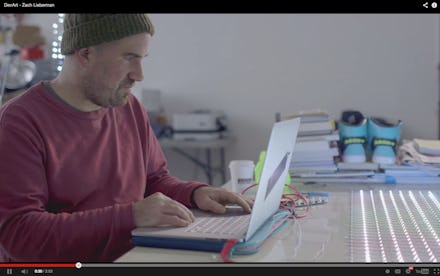Listen to Music Like You Never Have Before Using This Incredible Google Keyboard

In February, Google decided to change digital art.
The tech giant began a huge new patronage project to encourage creative coding among digital artists. "We want to change the perception of what art can be, and what code can be," they announced. "Code is much more than just numbers on a screen." If art mirrors reality, then the DevArt project is the new art of a new world. And it just sponsored a musical work that defines our strange new era.
Zach Lieberman is a coder and artist with a simple mission: "to surprise" and "break down the fragile boundary between the visible and invisible." He has created a bold vision of the whole Internet using only sound.
The Internet is, without contest, defining modern communication and commerce, and it's continuing to grow at an alarming rate. It's unimaginably large and important, but is invisible to us all. Artists and programmers have been trying to represent it visually, graphically and verbally, but Lieberman has figured out how best to show the Internet's size: through a keyboard that allows you to play it all at once.
Press a C-key and the piano will produce that note drawn from the Internet in real time. In fact, when the piano appears in London's Barbican Gallery in July, it will be hooked up to 10 speakers. Each one will face a different direction and will be programmed to draw musical notes only from streaming radio stations in that direction. If the pianist is facing north, he might hear South Korean K-pop coming from their right, good ol' Americana Garrison Keeler from their left, a Norwegian death metal stream coming from the north and Fela Kuti from behind.
This is what our world sounds like: connected, random, wondrous.
Lieberman embraces that randomness: "One of the things I enjoy about radio is this notion of liveness, that someone somewhere is talking, singing, shouting at you through the air, and the fact that you can easily scan through cultures by changing the dial," he writes on his DevArt blog.
"In NYC, for example, when you step into a cab, you can just as easily hear meringue music or someone on the radio speaking French, etc. There's something very universal about this."
This universality is the most important aspect of this project. In amalgamating all these random streams, Liberman's project makes a larger statement about the tools and media that connect our world.
That's because music is a universal language. Nearly the whole world uses the western harmonic scale because of its simplicity and flexibility, and because of this, anyone who understands the relationship between the tones on that scale can use it to express a wide variety of emotions. The radio, the Internet and our coding languages are similarly universal.
The more that we can find new ways to utilize these kinds of universal tools to promote cultural exchange, as the creative coding at Google DevArt encourages, the more harmonious, unified and collaborative our new world can become.